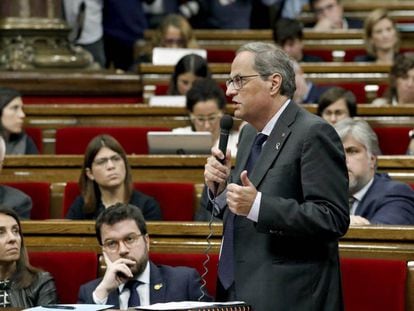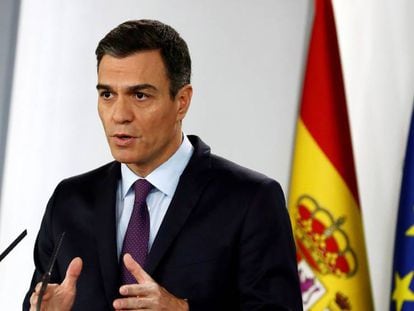In court, Catalan premier admits disobeying order to remove separatist symbols
Quim Torra is on trial for refusing to take down yellow ribbons and politically charged banners from public buildings during the municipal and European election campaigns this year
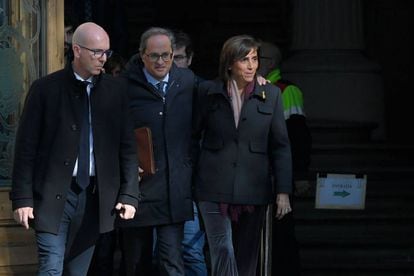
Catalan premier Quim Torra was on trial for disobedience on Monday over his refusal to take down politically charged signs from public buildings during the campaign leading up to the municipal and European elections of May 26.
The hearings, which are taking place at the regional High Court, could mean early elections in Catalonia in the event of a conviction.
The prosecution is seeking a 20-month ban on holding public office and a €30,000 penalty for Torra, a hard-line separatist politician who ignored warnings from electoral authorities that the regional government must maintain neutrality during election campaigns.

Torra refused to take down a banner from the Palau de la Generalitat, the seat of the Catalan government, expressing support for political leaders who were being tried at the Supreme Court for sedition and misuse of public funds in connection with the failed secession attempt of 2017. He also refused to remove esteladas – the unofficial flag adopted by supporters of Catalan independence – and yellow ribbons – a symbol of support for the jailed separatist leaders – from buildings belonging to the regional government.
During today’s hearing, Torra told the court that he disobeyed the instruction from the National Electoral Commission (JEC) to take down the symbols because, he claimed, “it was an illegal order.”
In around 30 minutes of statements during which he only took questions from the defense, Torra questioned the authority of the JEC and its impartiality, accusing its members of prevaricación – knowingly issuing an unfair decision – and even of coercion.
“I have many duties as a premier, and the first is to defend the rights and freedoms of the people,” he said. “I will never order the removal of a [yellow] ribbon or estelada. We are talking about censorship and the violation of rights. It was an act of censorship and I was not willing to allow it,” he added.
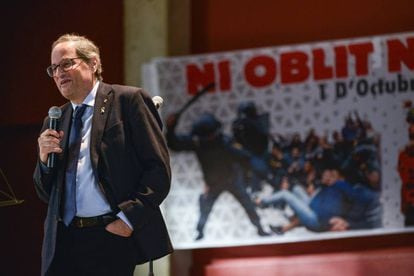
According to Torra, yellow ribbons “are not political but part of the people’s heritage.” He also said that not all the public buildings exhibiting separatist symbols were the property of the Catalan government. “I didn’t feel I had to give orders to a school principal or to a hospital director regarding any kind of decision,” he said.
The disobedience trial will end on Monday after a single hearing. A guilty verdict could still be challenged before the Supreme Court, but the latter’s decisions are final, meaning that Torra could cease to be the head of the Catalan government, and the regional parliament would then have to choose a successor.
This could prove complicated, as the combined forces of the two main separatist parties in the Catalan legislature – 34 seats for Together for Catalonia (JxCat) and 32 for the Catalan Republican Left (ERC) – are not enough for a majority in the 135-seat house. The four lawmakers for the other separatist group, the far-left CUP, have announced that they would rather hold early elections than support a new regional leader. This option is also preferred by Ciudadanos (Citizens), the Catalan Socialist Party (PSC), Catalunya en Comú Podem (an alliance of Catalonia in Common and Podemos) and the conservative Popular Party (PP).
In the event that Torra is barred from office, the parliament would be automatically dissolved two months after the first investiture vote to appoint a new government leader. Torra’s deputy, Pere Aragonès of ERC, would become the caretaker premier and new elections would be held 40 to 60 days after being called.
Catalonia last held an election in December 2017, when the region was under direct rule from Madrid following the failed secession bid. Torra was sworn into office in May 2018.
Separatist politicians have stated that an appeal could be dealt with by February at the latest, but the average time for the Supreme Court to hand down a final decision is around one year. In the case of Artur Mas, a former Catalan premier who organized an earlier unofficial independence consultation, the process took 21 months.
Other unknowns
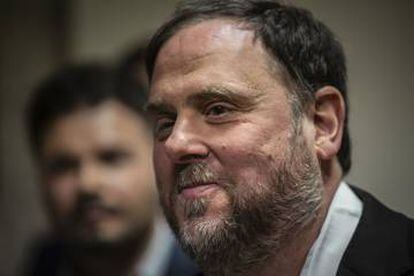
In the meantime, there are other factors that could also affect Catalan politics. On December 16, a court in Brussels will hold a hearing to decide whether former Catalan premier Carles Puigdemont will be extradited to Spain to face charges of sedition over the breakaway bid. Puigdemont fled with several government aides after the unilateral independence declaration of October 2017, and has since been fighting extradition to Spain, where he is wanted on sedition charges.
The Court of Justice of the European Union (CJEU) is also about to deliver a decision on Oriol Junqueras, the leader of the ERC party and Puigdemont’s former deputy premier. Although Junqueras has been sentenced to 13 years in prison in Spain for leading the independence push, the CJEU is deciding whether the politician – who successfully ran as a candidate to the European Parliament in May – has parliamentary immunity and the right to his seat as an MEP.
A decision favorable to Junqueras could also apply to Puigdemont, who picked up a seat in the European Parliament as well.
English version by Susana Urra.
